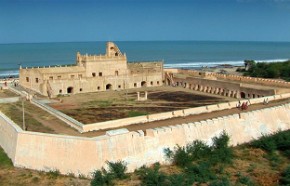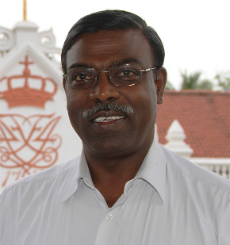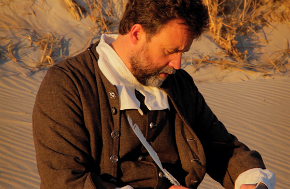Mission in spite of empire: The story of Bartholomus Ziegenbalg

The word mission leads a curious double life in mainline churches nowadays. On the one hand, it’s on everyone’s lips, a frequently frantic response to declining membership or a thinly veiled borrowing from the business world, the better to market our ecclesial product. On the other hand, it’s almost an expletive, the wicked work of colonial toadies destroying indigenous cultures and imposing Western religion with guns and Coca-Cola. In either case, the word tends to have a high recognition factor while remaining nearly void of content. Neither version of mission spends a lot of time with the details of actual efforts to spread the gospel.
Into this self-referential circle of North American anxiety comes the gentle rebuke of the Tamils of India. Not only Tamil Christians, either. Tamil Hindus and Tamil Muslims happily join the chorus in singing the praises of one Bartholomäus Ziegenbalg, the subject of Christopher Gilbert’s documentary Beyond Empires, distributed by Lamp Post Media. An 18th-century German Lutheran Pietist whose missionary career lasted only 13 years before his untimely death, Ziegenbalg’s unprecedented approach to the Great Commission caused him to become “the father of modern Protestant mission,” in the words of Tamil church historian Daniel Jeyaraj.
Read our latest issue or browse back issues.
 |
| Church historian Daniel Jeyaraj |
Not that Gilbert, an Australian filmmaker, knew any of this at first. Like most 21st-century Protestants, even German or Lutheran ones, Gilbert had never heard the unwieldy name until a Tamil church planter in New York City tracked him down in 2006 (having seen a short film he’d made about Redeemer Presbyterian in Manhattan) and asked him to tell the story of Ziegenbalg in videographic fashion. To make matters even more difficult, at that time there was only one book in English about the man in question: The First Protestant Missionary to India, by Brijraj Singh. Not a theological but rather a sociological account of Ziegenbalg’s impact on Tamil life and culture, the book exuded affection for its subject. And the author was a Hindu. Gilbert was intrigued.
As it turned out, 2006 was a bit late to get started on the film. It was actually the tercentenary year of Ziegenbalg’s arrival on the shores of India, and local celebrations were well under way. Gilbert wasn’t able to travel to Tranquebar himself, but he found a Muslim journalist to coordinate with a Hindu cameraman to shoot footage of the festivities. Both men asked Gilbert to call every morning and pray for their day’s labors before they set out. It was only four years later that Gilbert was able to travel to India himself and set to work on telling the story of “the Morningstar of India” who had inspired 10,000 Indians of all religious convictions to gather and commemorate him.
But who was this Ziegenbalg, and how did he, at the tender age of 23, initiate such a dramatic change in Christian missions?
One hundred years before the arrival of the British, Denmark had a trading colony on the southeast coast of India, rather self-importantly named Fort Dansborg but better known as Tranquebar. It was everything you’d expect of a colonial enterprise: abusive, exploitative, and reducing the local population to slavery. Accordingly, the church was carefully excluded. It was only when King Frederick IV’s mistress died in labor with his own child that a momentary pang of conscience induced him to accede to the wishes of his wife, mother, and chaplain, and he authorized a mission in the colony.
Danish volunteers were not forthcoming. Church had been defined territorially, indeed statically: hard as it is to fathom now, there was no theological framework for even imagining the onward movement of the apostolic gospel to new lands. It had been an assumed truth among Protestants that the task of the Great Commission had been laid only on the original apostles, or in any event had already been finished—forgetful, perhaps, of how recently Christianity had come to a number of European peoples. Some even considered mission to be a uniquely Catholic heresy.
The personnel for King Frederick’s new mission were to be found instead in Halle, Germany, a center for Pietist renewal, open and eager to take the torch to new lands. Ziegenbalg was young, frail, and suffered from chronic illness; on the other hand, he was devoted, and all of his family members had died, leaving him free to forsake his own country forever in service of another. Together with his colleague Heinrich Plütschau, he set sail for India and arrived in 1706, a landing of such enormous historical impact that already in 1931 it was being reenacted on grainy black-and-white film, as shown in Gilbert’s documentary.
Ziegenbalg did not arrive the ideal missionary. Like all too many of his kind before and since, he assumed that the Tamils were uncivilized and required European enlightenment to become Christian, if not human. His fellow Europeans certainly thought so. What changed things for him, and quickly, was his mastery of the Tamil language: within six months he was reading, writing, and speaking it. He attended classes for children in order to learn, took up residence among the slaves in the Tamil quarter, and almost immediately began to see his mission objects in a new light, as subjects equally made in the image of God.
A more dramatic determination followed from this: Tamils ought not be required to adopt European ways of being Christian. Not only their own language, not only their own dress, but even their own religious traditions were legitimate.
Now credited with being “the first Indologist,” Ziegenbalg inaugurated the study of other religions among Christians and became the world’s first European expert on Hinduism. He began collecting Tamil palm-leaf manuscripts and studied the Bhakti spirituality within Hinduism that was dominant among the Tamils. His own Pietist Christianity shared resonances with the Bhakti tradition, and he encouraged the Tamils he met to reconsider to whom they offered their devotion but not necessarily how they did it. To be sure, he opposed practices he found to be at odds with the gospel, such as the devadasi women being consecrated to temple life or the burning of widows. But his respect and openness for indigenous spirituality was without precedent or peer.
In due course Ziegenbalg set about building a church for the community at Tranquebar. But the Danes didn’t want to share space with the despised locals, so Ziegenbalg had to build a second, the Jerusalem Church which stands to this day. Some years later he built a seminary for the training of indigenous leaders. He translated the whole of the New Testament into Tamil and saw to its printing, and was still working on the Old Testament when he died.
Akin to Luther’s codification of German through his own Bible translation, Ziegenbalg gave modern Tamil its form. At his time, there was a rather enormous gap between classical Tamil as found on the palm-leaf manuscripts and spoken Tamil—so Ziegenbalg adapted the old script to suit the modern form, and that is the script still in use in Tamil Nadu today. And once there was a written script, of course there needed to be places for people to learn it, so Ziegenbalg built schools for both boys and girls. Many stirring testimonies in the documentary cite Ziegenbalg as the origin of women’s liberation in India. To this he added orphanages and created employment for Tamils who’d been rejected by their families upon their conversion.
Actually, within Ziegenbalg’s own lifetime, the number of Tamil converts never amounted to more than 250. Despite this, he was met with virulent opposition by the local authorities and even fellow missionaries. The colonial governor harassed Ziegenbalg, confiscated his funds arriving from overseas, and once threw him in prison for four months of solitary confinement—though at other times he invited Ziegenbalg to dinner, lent him his horse, and donated bricks to the church. Perplexed by this hot-and-cold behavior, Ziegenbalg finally discovered after eight years that the governor had been under orders by the director of the Danish East India Company to destroy the mission’s work: the merchants knew all too well how deadly Tamil conversion would be for their greedy designs.
At this, Ziegenbalg undertook the dangerous sea voyage back home for a confrontation with king and company. In fact, the once-again conscience-stricken king had already found a new director for the DEIC, but the missionary was still laureled on his return home, regarded as a hero. He availed himself of the opportunity to marry as well, and Maria Dorothea Salzmann became an enthusiastic partner in his ministry.
Things were no better with the mission board. Some years before, two new missionaries had arrived, one by the name of Johann Ernst Gründler, who shared Ziegenbalg’s view of things and held down the fort while Ziegenbalg returned to Denmark. The other missionary regarded Tamils as filthy animals. Luckily, the latter swiftly returned home, along with Ziegenbalg’s original colleague Plütschau. Unfortunately, matters took a turn for the worse with the appointment of a radical Pietist named Christian Wendt to the mission board.
Convinced that Christianity should address the soul but ignore the body, Wendt’s mission theory—untested by any actual experience—demanded a verbal preaching of the gospel and then moving on. Ziegenbalg’s care for the health, education, and protection of his Tamils offended Wendt to the core, to which Ziegenbalg retorted that if the gospel caused Tamils to lose their livelihoods, then the gospel in turn demanded that he care for them. Undeterred, Wendt persecuted Ziegenbalg and assassinated his character at every opportunity. Before long the still-young man died after a six-month illness. Gründler followed him to the grave a year later, also under the stress of Wendt’s persecution.
 |
| Mark Stevick portrays 18th-century missionary Bartholomäus Ziegenbalg in the film Beyond Empires. |
Despite its short duration, modest number of converts, and perpetual affliction, Ziegenbalg’s ministry changed the entire trajectory of the Tamil people. As both contemporary Tamil scholar Daniel Jeyaraj and British missions scholar Andrew F. Walls affirm during interviews in the film, Christianity is not the culture-destroying invasion so many assume it to be; again and again it has proven to be an active force in preserving cultures. Right in the face of aggressive empire, Ziegenbalg affirmed, protected, and promoted indigenous Tamil culture, for gospel reasons. At the same time, on account of the same gospel, he sought to remove and suppress those elements of the culture that opposed human dignity and flourishing.
After illustrating its point vividly with interviews, maps, old documents, period illustrations, and paintings, the film ends with a challenge to Western presuppositions: “The idea of missionaries as culture destroyers is so deeply held as an article of faith now, especially in the West, that it causes even people of good will to want to separate Ziegenbalg’s work from his religious belief, as if somehow he did what he did in spite of his faith in Christ, and not because of it.”
Negotiations are under way with the History Channel and PBS about broadcasting the film, and it will be aired by National Religious Broadcasters on October 2–3. DVDs are available at beyondempires.com.
The takeaway of Beyond Empires is stirring: sometimes the church has managed to do exactly what it was called to do. In Ziegenbalg we see the church faithful to Jesus Christ, open to the other, demanding justice, enacting mercy, and walking humbly with God and neighbor alike. May those many Germanic syllables quickly become a household name!






